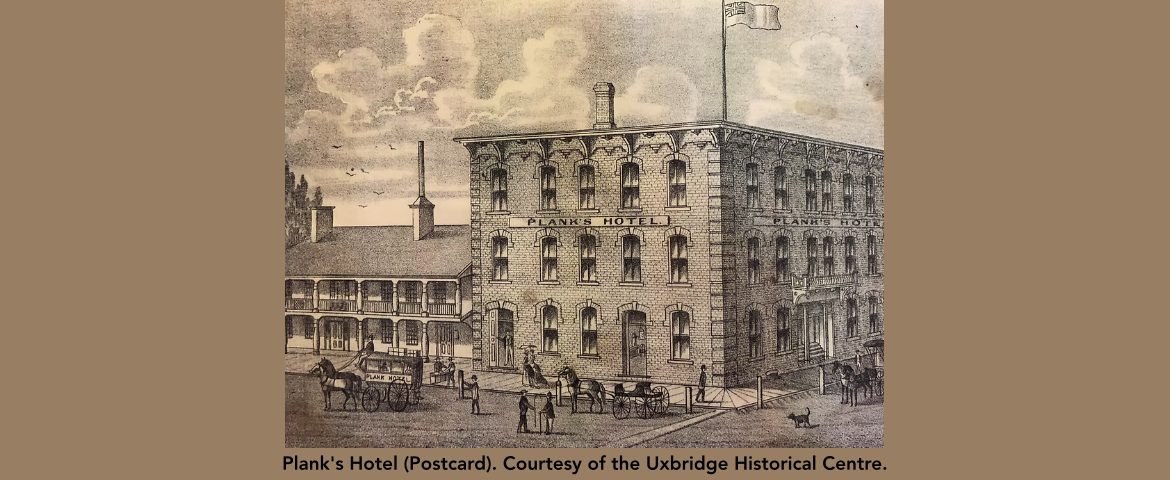Planks Hotel
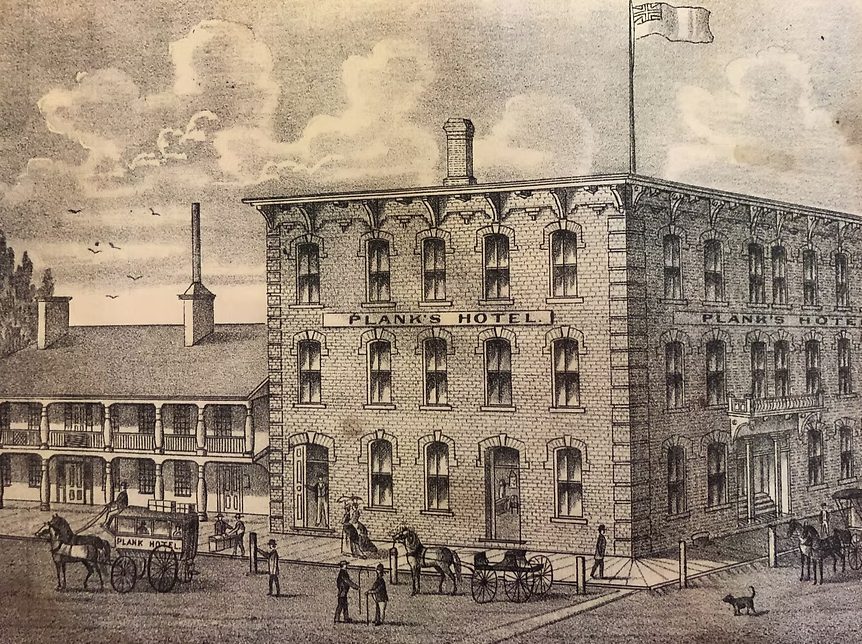
Plank’s Hotel (Postcard). Courtesy of the Uxbridge Historical Centre.
Introduction to a Uxbridge Landmark Long Gone
Uxbridge, Ontario, in the mid-1800s was a developing village poised for growth. As settlers arrived and infrastructure improved, the need for social hubs and accommodation became clear. Among the pioneering names in its hospitality history was the Plank family, whose establishment would later become a beloved local landmark—The Plank Hotel, which officially opened in 1873.
John P. Plank’s Arrival and Vision
John P. Plank, around the age of 30, emigrated from the United States with his family and made Uxbridge his new home. Seeing opportunity in the growing settlement, Plank built a small brick tavern in 1843. This modest establishment is believed to be the first dedicated public entertainment venue in Uxbridge. In his later years, John passed on the business to his son, Bartholomew Plank.
The Birth of The Plank Hotel in 1873
Ambitious and forward-thinking, Bartholomew took his father’s tavern to new heights—literally. In the fall of 1873, he completed a large, three-storey brick addition to the original structure. Thus, The Plank Hotel in Uxbridge opened in 1873 at the bustling intersection of Brock and Main Streets, right at the southwest corner of the village center.
This hotel wasn’t just a place to sleep; it represented progress, connectivity, and hospitality at its best.
Strategic Location and Layout
The location couldn’t have been better—central, accessible, and positioned to catch the eye of both locals and travelers. A look at historical maps, like the one included in period records, shows J.P. Plank’s plot clearly situated in the heart of town. This placement enabled the hotel to become a prominent community gathering spot.
Amenities and Unique Offerings
In 1874, just a year after the hotel’s grand opening, Bartholomew added a major perk: free transportation between the train station and the hotel. This innovative move helped attract customers from outside the town, boosting its reputation and business reach.
From entertainment to lodging, The Plank Hotel became the go-to place for both locals and newcomers alike.
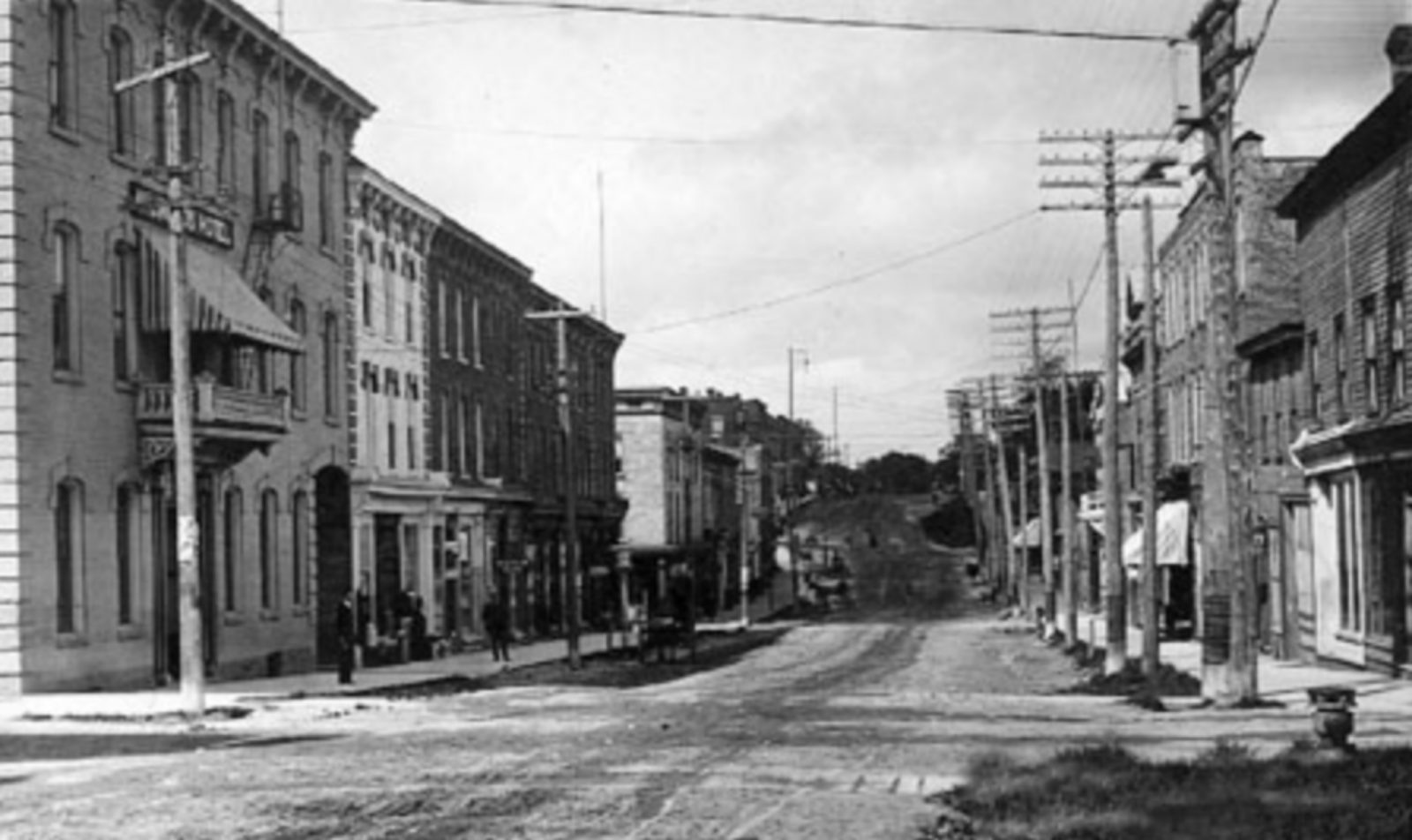
Early 1900’s view of Brock Street looking west. You can see the Arlington Hotel on the left.
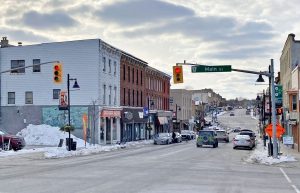
Brock Street East Uxbridge 2021
Avoiding Disaster – The 1874 Chimney Fire
Tragedy nearly struck in December of 1874 when a fire was discovered in the hotel’s chimney. Fortunately, the flames were caught in time, saving the establishment from destruction. This close call, however, underscored the ever-present risks buildings of the time faced, especially those with heavy foot traffic and wood heating systems.
Prohibition and Changing Laws
John P. Plank’s time operating the tavern came before the era of strict prohibition laws. This allowed for more relaxed management when it came to alcohol and entertainment. Interestingly, Plank passed away in 1876, years before prohibition regulations began being strictly enforced.
Leadership Under Bartholomew Plank
Bartholomew, or B. Plank as some records note, remained at the helm until his death in 1891. His era of management is often seen as the golden years of the hotel. It continued to thrive and evolve, cementing its role in the social and economic fabric of Uxbridge.
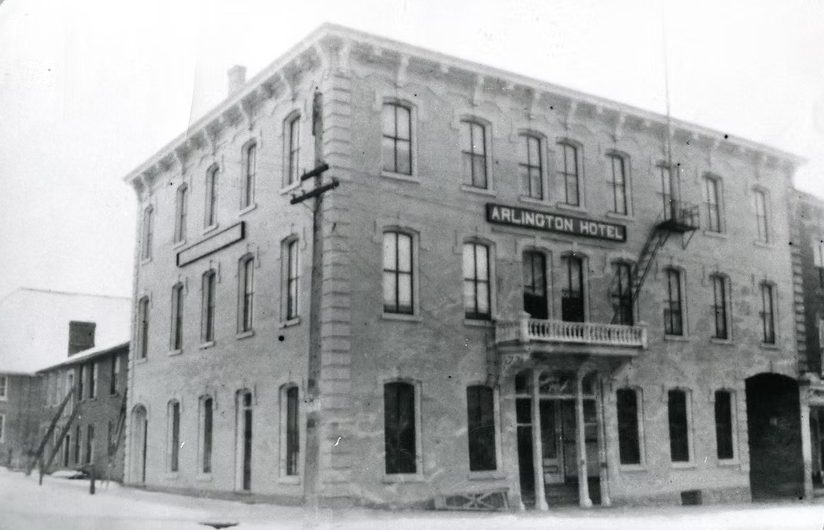
The Arlington Hotel located on the corner of Brock St and Main St. Behind the hotel you can just make out the Uxbridge Music Hall. Arlington Hotel. Courtesy of the Uxbridge Historical Centre. Acc. #: 972.18.1
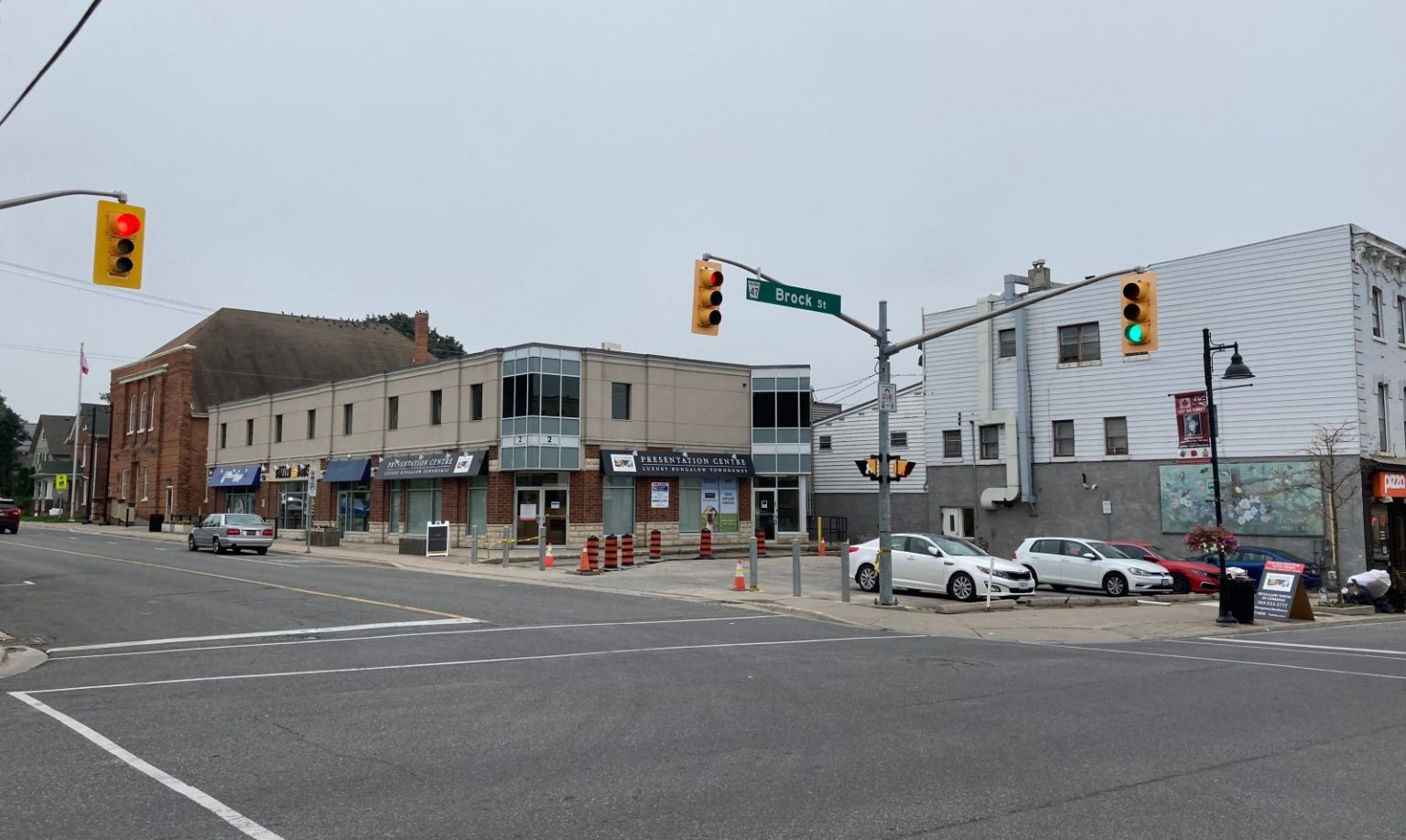
This photo shows the corner of Brock St E and Main St as it looks today (2021)
Transition and Transformation
Following B. Plank’s passing, the property was sold by the family. While the next owner remains unnamed, the hotel underwent a rebranding and emerged with a new identity: The Arlington Hotel. Though the name changed, its role in the community remained significant.
The Final Chapter – 1921 Fire
Sadly, the Arlington Hotel met a fiery end in 1921 when it burned to the ground. The once-vibrant establishment was reduced to ashes, marking the end of an era for the town.
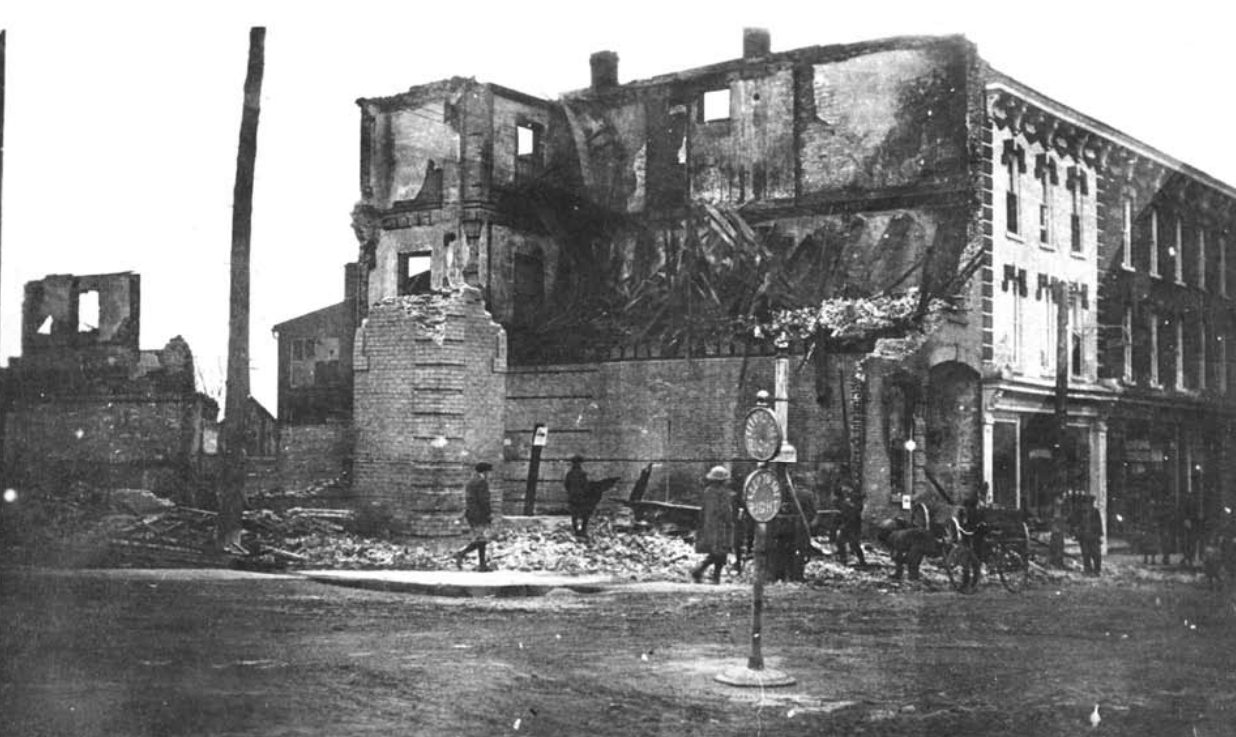
Legacy and Later Use of the Site
Years later, in 1947, the land that once housed the Plank Hotel was converted into a garage and later purchased by Alex Williamson, and became home to Williamson Chevrolet-Oldsmobile. While the building itself no longer stood, the land remained a point of significance in Uxbridge’s evolving landscape.
The Plank Hotel’s Cultural Impact
The Plank Hotel wasn’t just a business—it was a cultural cornerstone. It supported the local economy, offered jobs, and helped foster community identity. Events, meetings, and celebrations held there helped shape the town’s social fabric for decades.
Historical Mapping and Significance
Looking at historic maps, you can find the location labeled as “J.P. Plank”, confirming its central position and providing a window into Uxbridge’s urban layout in the 19th century. It remains a reference point for local historians and architecture enthusiasts alike.
Preservation and Remembrance Today
While there may be no standing structure left, the story of The Plank Hotel lives on in archives, historical accounts, and community memory. Its importance is occasionally highlighted in local historical tours and museum displays.
Lessons from The Plank Hotel’s History
Entrepreneurs today can learn from Bartholomew Plank’s foresight: innovation, strategic location, and community involvement are timeless keys to success. Even in the 1800s, creating convenience for customers—like the free train station shuttle—was a smart move that modern businesses still use.
FAQs About The Plank Hotel in Uxbridge
1. When did The Plank Hotel officially open?
It officially opened in the fall of 1873 with a large three-storey brick addition.
2. Who was the founder of the original establishment?
John P. Plank founded the original tavern in 1843, which his son later expanded into a hotel.
3. What happened to the hotel in 1874?
A fire was discovered in the chimney but was quickly extinguished, saving the hotel.
4. Why was the hotel renamed?
After Bartholomew Plank’s death in 1891, the new owner renamed it the Arlington Hotel.
5. When and how was the hotel destroyed?
It burned to the ground in 1921 and was never rebuilt.
6. What is located at the site today?
The site became home to a garage in 1947, purchased by Alex Williamson.
Conclusion: A Symbol of Ambition and Legacy
The story of The Plank Hotel in Uxbridge opened in 1873 is more than a tale of brick and mortar. It’s a reflection of vision, community, and change. From John P. Plank’s humble tavern to Bartholomew’s grand hotel, it stood for decades as a proud symbol of progress. Though gone, its legacy endures in the hearts of Uxbridge residents and in the annals of Canadian hospitality history.
Photos and Credits
Uxbridge The Good Old Days by: J. Peter Hvidsten
Uxbridge The First 100 Years by: J. Peter Hvidsten
Learn more about the history in Uxbridge by following our Uxbridge History Blog


 Facebook
Facebook
 X
X
 Pinterest
Pinterest
 Copy Link
Copy Link
